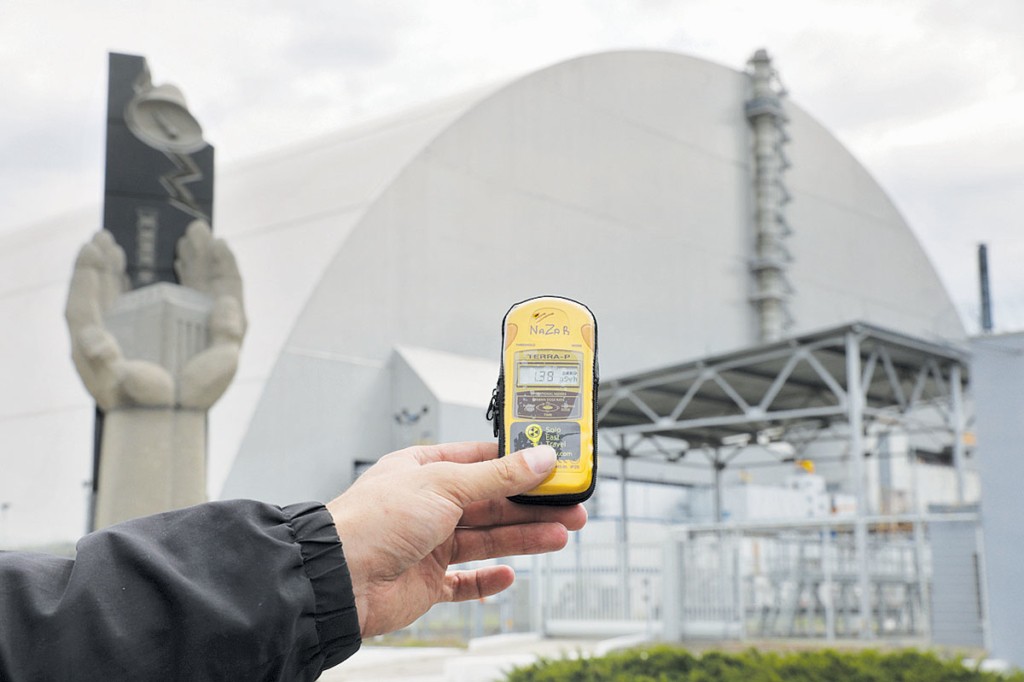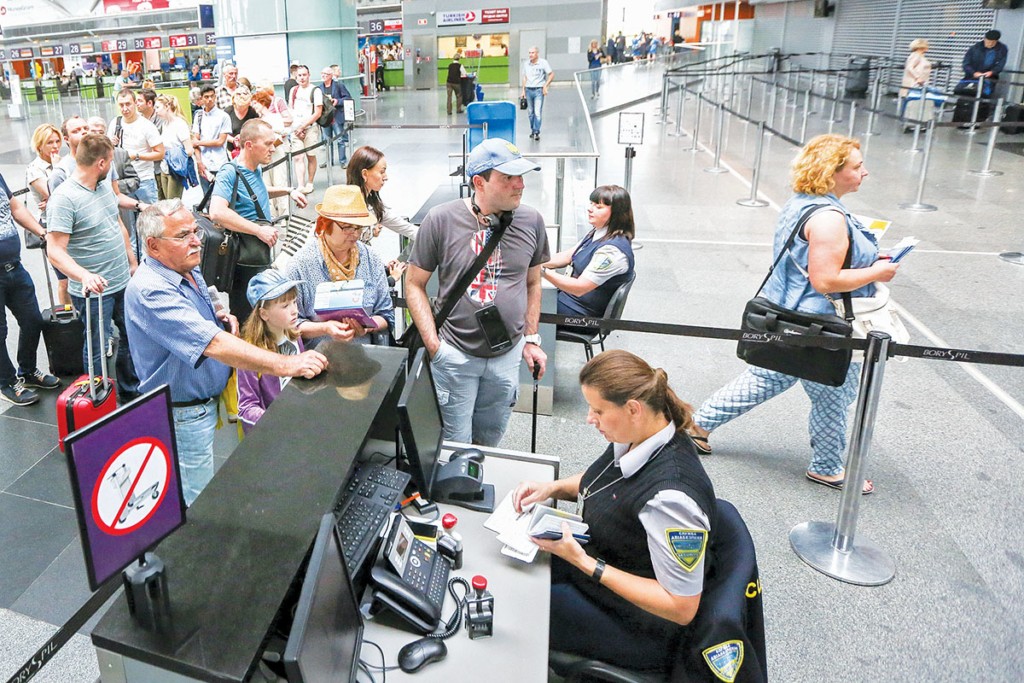As Ukraine celebrates 26 years of independence, the nation’s journey out of Russia’s orbit to the circle of European nations is continuing.
While there is still a long way to go, Ukraine passed some major milestones in the last year as it seeks to shake off Kremlin influence once and for all.
Escape from the USSR
In the future, it might seem that the EuroMaidan Revolution three years ago was the day when the new Ukraine was born. But Aug. 24, 1991 was a date of no less importance.
It marked the end of 70 years of propaganda, purges, and oppression. A quarter of a century on, Ukraine, like other former Soviet states, is still trying to rebuild its national identity and recover hidden or falsified parts of its history.
An entire generation has grown up that has never lived under Soviet rule, but the Soviet legacy hasn’t disappeared. Vladimir Putin’s Russia continues to use lies and aggression to meddle in other countries’ internal affairs and steal their territories.
The war in eastern Ukraine and the annexation of Crimean peninsula has entered its fourth year, with no end in sight. The war in the Donbas has killed more than 10,000 people, wounded 21,000, and displaced an estimated 1.7 million people. The Crimean Tatars remain deprived of their civil rights, and those who dare to speak out in the Russian-occupied Ukrainian territory of Crimea face persecution and imprisonment.
However, the divorce from Soviet legacy isn’t about tearing down Communist monuments, or rewriting history books, or prohibiting Russian social networks. The divorce requires fighting against all Soviet ills — corruption, bureaucracy, the stifling of dissenting voices, and selective justice.
That’s why it’s important for Ukraine to continue challenging Russia in a civil and diplomatic way, though with the support of powerful allies. The Normandy format talks between Ukraine, Russia, France and Germany have been unsuccessful so far, but keeping Ukraine’s European allies engaged in the peace process as Ukraine faces the powerful aggressor state Russia is vitally important.
Earlier this year Ukraine took Russia to the United Nations International Court of Justice in The Hague to hold the Kremlin accountable for its military occupation of the Donbas and annexation of Crimea.
So it is important for Ukraine to maintain good relations with the European Union and the United States, both of which have so far kept their sanctions against Russia in place. Visa-free travel for Ukrainians to the Schengen Area, which came into force in June, was a long-awaited gift to the country, but Ukraine also needs EU and U.S. support to strengthen its economy, cyber security, and energy sectors.
Ukraine also needs to prosecute officials from the regime of former President Viktor Yanukovych, recover billions of dollars stolen by him and his cronies, and find the killers of Putin critics who were murdered in Ukraine — Belarusian journalist Pavel Sheremet and former Russian lawmaker Denys Voronenkov. No progress has been made in any of these issues over the last year.
And last year was also notable, in a negative way, for the emergence of serious cyber-attacks on the country and the resignations of top reformers.
KEY EVENTS
E-declarations
Ukraine’s long-awaited electronic asset declaration system went live last year. Despite attempts to sabotage the system by public officials, and general skepticism, it has worked. By Nov. 1, nearly 200,000 public declarations by officials and members of parliament had been made, marking a new stage in the fight against corruption.
The staggering wealth of Ukraine’s poorly-paid officials certainly stirred discussion over how they had come by hundreds of millions in cash, mansions, cars, and luxury goods. Moreover, not a single top official has been investigated over the sources of their wealth, or been punished for making fraudulent earnings.
The first, and so far only “big fish” on trial for corruption is Roman Nasirov, the former chief of the State Fiscal Service. The National Anti-Corruption Bureau has linked him to an embezzlement scheme with the state-owned gas producer Ukrgazvydobuvannya. He was arrested in March and is currently in custody.
Chornobyl safety

A man holds a Geiger counter near the New Safe Confinement covering the destroyed reactor No. 4 at the Chornobyl nuclear plant on July 9. (Volodymyr Petrov)
On Nov. 29 a new metal confinement was moved into place over the decaying concrete dome that covers the destroyed reactor No. 4 at the Chornobyl nuclear plant. The 108-meter-high structure is expected to protect Ukraine and neighboring states from radioactive contamination from the ruined reactor for 100 years. The structure was built by the French consortium Novarka and cost $1.6 billion, funded by the European Bank for Reconstruction and Development (EBRD).
IMF tranche
After a one-year delay, the International Monetary Fund in September approved a third, $1 billion aid tranche to Ukraine as part of a $17.5 billion program that is to run through the end of 2018. Although the country hasn’t completed any of the stipulated reforms, the IMF went easy this time, praising a good beginning to five out its 14 conditions.
However, the next tranches will be more difficult to get in future, and the IMF may be the main driving force for Ukraine’s leaders to finally fulfill their commitments and finish the long-stalled privatization of state enterprises, the removal of the moratorium on the sale of agricultural land, pension reform, the creation of anti-corruption courts, and other vital reforms.
PrivatBank buyout
In December the Ukrainian government acquired a 100-percent stake in the largest bank in the country, PrivatBank, which previously belonged to oligarchs Ihor Kolomoisky and Gennadiy Bogolyubov. The trigger for nationalization was said to be PrivatBank’s toxic credit portfolio, which had at least Hr 89 billion ($3.39 billion) in unpaid insider loans. The resolution of the problems at PrivatBank is one of the key conditions for the granting of the fourth IMF loan tranche in future.
Eurovision
Despite some doubts that Ukraine, a country de-facto at war, would be able to host a $32 million international event, and attempts by Russia to create a scandal, Eurovision 2017, held in Kyiv in May, was a great success.
An estimated 20,000 foreigners came to Kyiv during the contest, and a total of 64,000 people attended the nine Eurovision shows at the International Exhibition Center. With Salvador Sobral emerging as the winner, Eurovision goes to Portugal next year.
Visa-free travel

Passengers line up at passport control at Kyiv’s Boryspil International Airport on the first day of visa-free travel to the Schengen Area on June 11. (Kostyantyn Chernichkin)
On May 17, after several years of negotiations, the European Parliament in Strasbourg, France, finally confirmed visa-free travel for Ukrainian citizens to 34 European states. The decision came into force on June 11.
Ukrainian President Petro Poroshenko hailed the move as Ukraine’s “final farewell to the Soviet and Russian empire.”
And at the end of May, Dutch senators voted in favor of Ukraine’s trade and political Association Agreement with the EU. The provision should formally come into force on Sept. 1. The EU Commission President Jean-Claude Juncker stated that the vote, “sends an important signal from the Netherlands and the entire EU to our Ukrainian friends: Ukraine’s place is in Europe.”
Trump effect
After Donald J. Trump won the presidential elections in the United States on Nov. 8, Ukraine suddenly found itself in the spotlight across the Atlantic as the United States began an investigation into Russia’s interference in the elections, and whether Putin had helped Trump to become president.
In response to accusations that the Trump campaign colluded with Russia, Trump supporters demanded an investigation into “Ukrainian efforts to sabotage (Trump’s) 2016 campaign” by helping his rival Hillary Clinton. The claimed evidence of Ukrainian interference involved Democratic National Committee operative Alexandra Chalupa, who had investigated the ties of former Trump campaign chairman Paul Manafort to the Russian government and Ukraine’s ousted President Viktor Yanukovych.
In July the Republican-led U. S. Congress passed a bill, signed by Trump in August, on toughening sanctions against Russian companies, primarily oil and gas producers. The bill expressed U.S. support for the government of Ukraine in restoring its territorial integrity, and condemned Russia’s invasion of eastern Ukraine and its annexation of the Ukrainian territory of Crimea.
IT success
Thirteen Ukrainian IT companies won places on the International Association of Outsourcing Professionals (IAOP) annual list of top tech firms, The Global Outsourcing 100. The ranking included EPAM, Luxoft, Ciklum, Intetics, TEAM International Services, and Softjourn, all of which have R&D centers in Ukraine. The six local Ukrainian firms are N-iX, SoftServe, Program-Ace, Eleks, Miratech, Softengi and Sigma Software.
